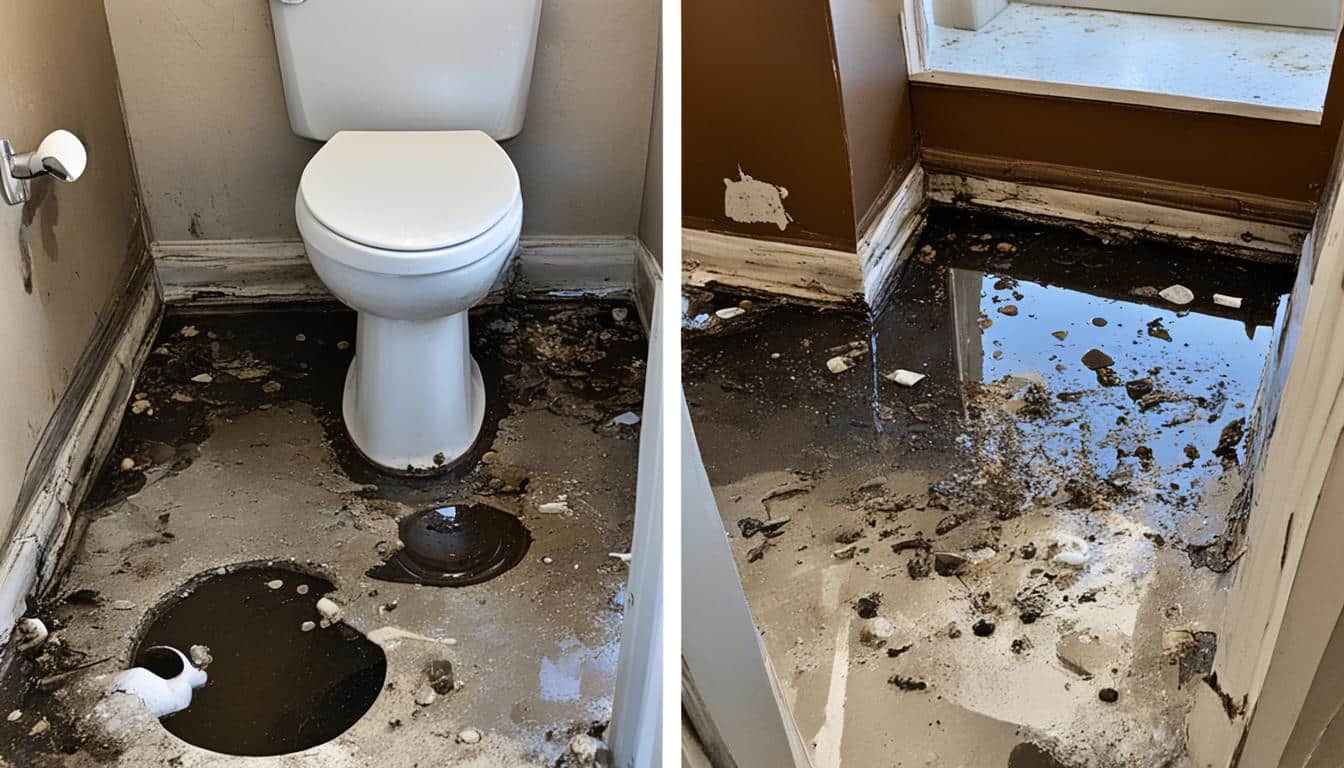Do you know the hidden dangers under Raleigh’s streets? They could harm your home without warning. Knowing the main reasons for sewer backups in Raleigh, NC, could prevent a big problem.
In Raleigh, sewer backups often happen when the public sewer system gets blocked or overflows. Tree roots, hair, grease, and other debris are common culprits. Also, severe weather can put too much rain on the system, causing backups in homes and businesses.
The City of Raleigh Public Utilities Department says homes below certain manholes are more at risk. This makes it important to know the system’s weaknesses and get help quickly.
Key Takeaways
- Tree roots, debris buildup, and foreign objects are leading causes of sewer backups in Raleigh, NC.
- Excessive rainfall can overwhelm the Raleigh sewer system, leading to overflows.
- Properties below the grade of the nearest upstream manhole cover are at higher risk for sewer backups.
- The City of Raleigh Public Utilities Department recommends installing backwater valves to prevent backups.
- The City uses CorVel Corporation for handling claims and payments related to sewer backup damages.
- Residents may need to cover significant repair costs upfront before reimbursement, with the evaluation process being time-consuming.
What is the most common cause of sewer backup in Raleigh, NC?
Knowing what causes sewer backups in Raleigh, NC, is key for homeowners and businesses. Many things can block sewers, but some are more common than others.
In Raleigh, sewer backups often happen because of things that shouldn’t be in the sewers. Raleigh Water says grease, tree roots, and non-flushable items are the main culprits. These blockages stop water from flowing right and can cause backups into buildings.
Also, if many drains in a place are slow or clogged, it might mean a bigger problem. This could be a blocked sewer line. A lot of these blockages come from grease in pipes, which hardens and blocks water.
Tree roots are another big problem. They can grow into sewer lines and cause big blockages. Plus, things like French drains that shouldn’t be there can also clog the system.
To prevent these issues, keeping the sewer lines in Raleigh well-maintained is important. Raleigh Water has a program to remove unwanted stuff from sewers. This helps keep the lines clear and working well.
If you’re dealing with sewer problems, getting help from professionals is a good idea. They can fix issues like grease, roots, or other blockages. This keeps the sewer lines running smoothly.
In short, knowing what causes sewer backups in Raleigh, NC, means knowing about grease, roots, and other items. Keeping the sewer lines in good shape and getting help when needed helps avoid these problems. This keeps the sewer system working well for everyone.
| Common Cause | Description | Preventative Measures |
|---|---|---|
| Grease Accumulation | Hardened grease blocks water flow | Avoid disposing grease down drains |
| Tree Roots | Infiltrate and penetrate sewer lines | Regular inspection and root removal |
| Non-Flushable Items | Hygiene products and wipes clog pipes | Dispose of properly, do not flush |
| Illegal Connections | French drains and similar connections | Ensure proper sewer line setup |
Other Common Causes of Sewer Backup in Raleigh, NC
Grease and cooking oils are big problems for sewer backups in Raleigh, NC. But, other factors also play a role. Knowing about these can help homeowners avoid problems.
Tree roots are a big problem. They get into sewer lines through small cracks or gaps. This causes blockages and backups. As trees grow, their roots look for moisture, damaging sewer pipes over time.
Damaged or broken pipes are another issue. Old pipes wear out, leading to cracks or holes. This stops wastewater from flowing right, causing backups. Also, if plumbing is installed wrong, it can lead to problems and backups.
Ground movement, from weather changes, can damage sewer lines. This can dislodge joints or create cracks. It also leads to obstructions in the pipes. Items like wipes and hygiene products washed down drains can clog the system too. Raleigh follows the North Carolina Plumbing Code to manage these materials and prevent clogs.
Clogged drain lines are common, causing floor drains to overflow. Clogs in sewer lines stop waste and debris from flowing right. This leads to backups.
These issues show how sewer backups are complex. Regular maintenance and careful use of plumbing systems are key. By tackling these problems early, Raleigh residents can avoid costly and disruptive sewer backups.
Conclusion
Knowing why sewer backups happen in Raleigh, NC, is key to stopping them before they start. Blockages from things flushed down the toilet, tree roots in old pipes, and too much rain are big reasons. To avoid these, it’s important to throw away waste properly and not flush items like wipes and paper towels.
Regular checks on your sewer system are also vital. Doing this every 18 to 20 months can spot problems early. If you notice a blockage, act fast and get help from a pro to avoid bigger damage. Following these tips can help as sewer backups are getting more common in the US.
People in Raleigh should think about getting backwater valves and extra insurance for sewer backups. Most policies don’t cover these issues. By being aware and acting quickly, we can all help reduce sewer backup problems. Adding these steps to your maintenance routine can give you peace of mind.






